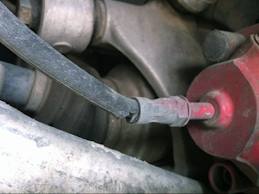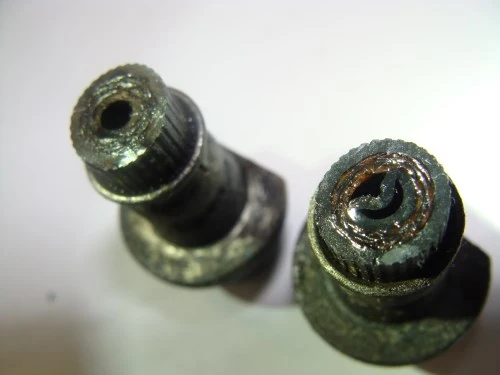Brake lines typically collapse due to internal damage or a blockage. Age and corrosion are common factors contributing to this issue.
Maintaining the safety and responsiveness of your vehicle’s braking system is crucial, and understanding the reasons behind brake line collapse is key to prevention. Brake lines, made of flexible rubber or reinforced hose, can deteriorate over time, leading to internal wear and tear.
Debris or contaminants inside the lines can prompt a blockage, which impedes the flow of brake fluid, essentially compromising the brake’s hydraulic pressure. These issues can result in a sudden and dangerous loss of braking power.
Regular inspections and proper maintenance of your vehicle’s brake lines can help avoid such potentially hazardous situations, ensuring a smoother and safer driving experience.
Symptoms Of Brake Line Failure
The ‘Symptoms of Brake Line Failure’ can be quite alarming. When brake lines collapse, immediate action is necessary. Recognizing the signs early could save lives.
Let’s delve into the symptoms that should never be ignored.
Soft Or Spongy Brake Pedal
One clear symptom of a failing brake line is a soft or spongy feeling underfoot. This happens when air, which should not be present, enters the brake lines.
It results in a brake pedal that doesn’t resist pressure as it normally would. A spongy brake pedal requires a closer look at your brake lines.
Reduced Braking Power
Another alarming sign is reduced braking power. If the vehicle takes longer to stop, or the pedal nearly reaches the floor before engaging the brakes, it’s likely that the brake lines are compromised.
This reduction in braking power can make stopping quickly a challenge, and it’s a sign to have your brakes inspected immediately.

Credit: www.ericthecarguy.com
Common Causes Of Brake Line Collapse
When brakes fail, it’s often due to a brake line collapse. This can be dangerous. Let’s explore reasons why brake lines give out.
Wear And Tear Over Time
Like all car parts, brake lines grow old. They handle huge pressure with each stop. Age can weaken them. Common signs include fluid leaks and spongy brakes. Regular checks can catch this early.
Corrosion And Rust
Water and salt cause brake lines to rust. This can lead to holes or weak spots in the line. If you live where it snows or near the ocean, check your brake lines often.
Manufacturing Flaws
Sometimes brake lines have defects from the start. This could be due to poor quality materials or mistakes during production. If you suspect this, a mechanic can tell you for sure.
Recognize the signs and act fast to maintain safety. Look out for leaks, unusual brake feel, and corrosion. Replace old or faulty brake lines as needed. Keep your car safe for every journey.
Impact Of External Factors
The Impact of External Factors plays a significant role in automobile safety and maintenance. Among these, the condition of brake lines is critical.
Various external factors can cause brake lines to collapse, compromising the integrity of a vehicle’s braking system. Understanding these can help prevent unexpected failures and ensure safe driving.
Vehicle Accidents And Trauma
Collisions and bumps can have severe effects on a vehicle’s brake lines. The physical impact can kink or crush the lines, obstructing brake fluid flow. Even minor impacts that cause undetected damage may lead to eventual brake line collapse.
To avoid this, always inspect brake lines after any vehicle incident.
Exposure To Harsh Chemicals
Brake lines face constant exposure to various substances on the road. Harmful chemicals, such as road salts and vehicle fluids, can corrode the exterior and weaken the lines. This degradation can make them susceptible to collapse.
- Routinely wash the underside of the vehicle.
- Check for signs of corrosion during maintenance.
Extreme Temperature Fluctuations
Brake lines can weaken under temperature stress. Extreme cold can make them brittle, while high heat can lead to expansion and softening.
Both conditions may result in failure or collapse.
- Park in temperate conditions when possible.
- Maintain fluid levels to help moderate temperatures.
- Regularly inspect brake lines for weather-related damage.
Preventative Maintenance To Avoid Collapse
Ensure your vehicle’s safety by understanding the importance of brake lines. Prevent brake line collapse with routine maintenance and attention. This essential care keeps you safe on the road.
Regular Inspection Routines
Regular inspections are key in preventing brake line collapse. Check brake lines for:
- Physical damage: Look for any signs of wear or cracks.
- Corrosion: Rust or corrosion can weaken lines.
- Leakage: Spot any fluid leaks early to prevent failure.
Mark your calendar for consistent check-ups. Professional inspections should happen yearly. This proactive approach catches issues before they lead to collapses.
Relevant Fluid Replacement
Brake fluid is vital for hydraulic systems. Old fluid can lead to brake line damage. Follow these steps:
- Check fluid level: Ensure it’s within recommended limits.
- Inspect quality: Change fluid if it’s dark or contains debris.
- Follow vehicle manufacturer’s fluid replacement schedule.
Clean, quality brake fluid prevents internal line deterioration. This reduces the risk of a collapse.
Upgrading To More Durable Materials
Consider upgrading to stainless steel brake lines. Benefits include:
| Standard Lines | Stainless Steel Lines |
|---|---|
| Prone to corrosion | Resist rust and wear |
| May bulge under pressure | Stronger, maintain shape |
| Shorter lifespan | Last longer, better value |
Investing in durable materials results in a better driving experience. Stronger lines mean less maintenance in the long run.
Diagnosing A Collapsed Brake Line
Your vehicle’s brake lines are essential for safe driving. Like any other part, they can fail. Recognizing a collapsed brake line is vital to vehicle safety. This guide walks through easy diagnostic steps to check your brake lines.
Visual Inspection Tips
Start with a visual check to spot any obvious issues with the brake lines.
- Look for physical damage: Cracks, wear, or rust can indicate a problem.
- Check the brake line path: It should be clear of obstructions.
- Examine fittings and connections: They must be secure and leak-free.
Pressure Testing For Leaks
Pressure testing helps find leaks that a visual inspection might miss.
- Use a brake pressure tester: Attach it to the brake system.
- Pump the tester: Apply pressure to mimic brake use.
- Monitor the readings: Falling pressure indicates a leak.
Professional Diagnostic Tools
Professionals use specialized tools to diagnose brake line issues.
- Brake fluid test strips: These check for contamination.
- Brake bleeders: They help remove air that can cause line collapse.
- Electronic testers: More advanced tools can simulate and measure brake force.
Remember, maintaining brake lines is crucial. Perform checks regularly. Stay safe!

Credit: www.bugeyeguys.com
Consequences Of Neglecting Brake Line Health
Your vehicle’s brake lines are like arteries. Healthy brake lines ensure smooth stopping. Ignoring them can lead to serious issues.
Let’s explore what could happen if you overlook their health.
Decreased Vehicle Safety
Safety takes a hit first. Bad brake lines mean poor braking. This causes:
- Longer stopping distances
- Unexpected braking responses
- Inability to stop in emergencies
This risks your life and others. Always check your brake lines.
Higher Costs From Compounded Damages
Small fixes grow into big bills. Brake line neglect can cause:
- More wear on brake parts
- Bigger repairs needed
- Full system replacements
Stay ahead with regular maintenance to save money.
Legal And Compliance Issues
Cars must meet safety standards. Neglected brake lines can lead to:
- Failed inspections
- Potential fines
- Legal trouble after accidents
Keep brake lines in check to avoid these issues.

Credit: www.youtube.com
Final Word
Brake line collapse can be a serious issue for any vehicle owner. It’s usually caused by blockages, corrosion, or external damage.
Routine maintenance and prompt attention to any brake system changes can prevent this problem. Remember, your safety on the road hinges on reliable brakes.
Keep them in check to ensure a smooth ride.
